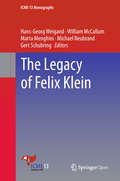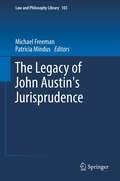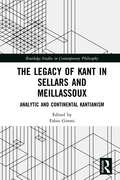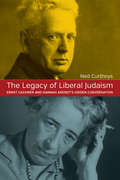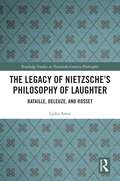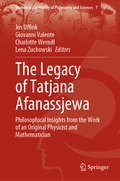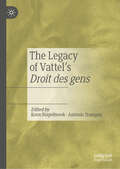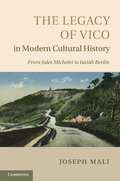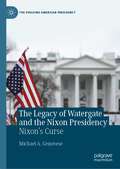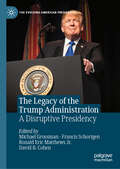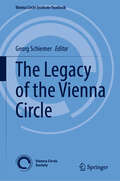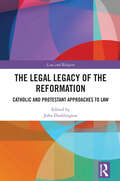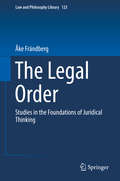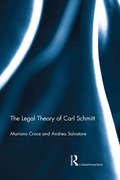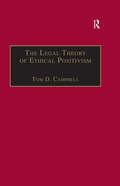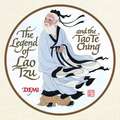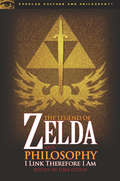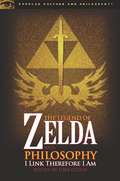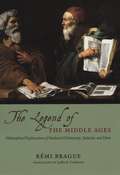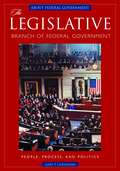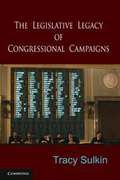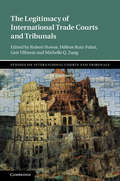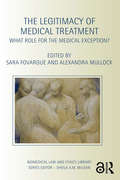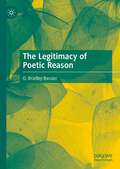- Table View
- List View
The Legacy of Felix Klein (ICME-13 Monographs)
by Michael Neubrand Hans-Georg Weigand Gert Schubring William McCallum Marta MenghiniThis open access book provides an overview of Felix Klein’s ideas, highlighting developments in university teaching and school mathematics related to Klein’s thoughts, stemming from the last century. It discusses the meaning, importance and the legacy of Klein’s ideas today and in the future, within an international, global context. Presenting extended versions of the talks at the Thematic Afternoon at ICME-13, the book shows that many of Klein’s ideas can be reinterpreted in the context of the current situation, and offers tips and advice for dealing with current problems in teacher education and teaching mathematics in secondary schools. It proves that old ideas are timeless, but that it takes competent, committed and assertive individuals to bring these ideas to life. Throughout his professional life, Felix Klein emphasised the importance of reflecting upon mathematics teaching and learning from both a mathematical and a psychological or educational point of view. He also strongly promoted the modernisation of mathematics in the classroom, and developed ideas on university lectures for student teachers, which he later consolidated at the beginning of the last century in the three books on elementary mathematics from a higher standpoint.
The Legacy of John Austin's Jurisprudence
by Michael Freeman Patricia MindusThis is the first ever collected volume on John Austin, whose role in the founding of analytical jurisprudence is unquestionable. After 150 years, time has come to assess his legacy. The book fills a void in existing literature, by letting top scholars with diverse outlooks flesh out and discuss Austin's legacy today. A nuanced, vibrant, and richly diverse picture of both his legal and ethical theories emerges, making a case for a renewal of interest in his work. The book applies multiple perspectives, reflecting Austin's various interests - stretching from moral theory to theory of law and state, from Roman Law to Constitutional Law - and it offers a comparative outlook on Austin and his legacy in the light of the contemporary debate and major movements within legal theory. It sheds new light on some central issues of practical reasoning: the relation between law and morals, the nature of legal systems, the function of effectiveness, the value-free character of legal theory, the connection between normative and factual inquiries in the law, the role of power, the character of obedience and the notion of duty.
The Legacy of Kant in Sellars and Meillassoux: Analytic and Continental Kantianism (Routledge Studies in Contemporary Philosophy)
by Fabio GironiContemporary interest in realism and naturalism, emerging under the banner of speculative or new realism, has prompted continentally-trained philosophers to consider a number of texts from the canon of analytic philosophy. The philosophy of Wilfrid Sellars, in particular, has proven remarkably able to offer a contemporary re-formulation of traditional "continental" concerns that is amenable to realist and rationalist considerations, and serves as an accessible entry point into the Anglo-American tradition for continental philosophers. With the aim of appraising this fertile theoretical convergence, this volume brings together experts of both analytic and continental philosophy to discuss the legacy of Kantianism in contemporary philosophy. The individual essays explore the ways in which Sellars can be put into dialogue with the widely influential work of Quentin Meillassoux, explaining how—even though their methods, language, and proximal influences are widely different—their philosophical stances can be compared thanks to their shared Kantian heritage and interest in the problem of realism. This book will be appeal to students and scholars who are interested in Sellars, Meillassoux, contemporary realist movements in continental philosophy, and the analytic-continental debate in contemporary philosophy.
The Legacy of Liberal Judaism: Ernst Cassirer and Hannah Arendt's Hidden Conversation
by Ned CurthoysComparing the liberal Jewish ethics of the German-Jewish philosophers Ernst Cassirer and Hannah Arendt, this book argues that both espoused a diasporic, worldly conception of Jewish identity that was anchored in a pluralist and politically engaged interpretation of Jewish history and an abiding interest in the complex lived reality of modern Jews. Arendt's indebtedness to liberal Jewish thinkers such as Moses Mendelssohn, Abraham Geiger, Hermann Cohen, and Ernst Cassirer has been obscured by her modernist posture and caustic critique of the assimilationism of her German-Jewish forebears. By reorienting our conception of Arendt as a profoundly secular thinker anchored in twentieth century political debates, we are led to rethink the philosophical, political, and ethical legacy of liberal Jewish discourse.
The Legacy of Nietzsche’s Philosophy of Laughter: Bataille, Deleuze, and Rosset (Routledge Studies in Twentieth-Century Philosophy)
by Lydia AmirThis book investigates the role of humor in the good life, specifically as discussed by three prominent French intellectuals who were influenced by Nietzsche's thought: Georges Bataille, Gilles Deleuze, and Clément Rosset. Lydia Amir begins by discussing Nietzsche’s reception in France, and she explains why and how he came to be considered a "philosopher of laughter" in the French academe. Each of the subsequent three chapters focuses on the significance of humor and laughter in the good life as advocated by Bataille, Deleuze, and Rosset. These chapters also explore the complex relationship between the comic and the tragic, and of humor and laughter to irony, satire, and ridicule. The Legacy of Nietzsche’s Philosophy of Laughter makes an invaluable contribution to recent interpretive work done on Bataille and Deleuze, and offers further introduction to the relatively understudied Rosset. It illuminates the philosophies of these three thinkers, their connection to Nietzsche, and, overall, the significant role that humor plays in philosophy.
The Legacy of Tatjana Afanassjewa: Philosophical Insights from the Work of an Original Physicist and Mathematician (Women in the History of Philosophy and Sciences #7)
by Jos Uffink Giovanni Valente Charlotte Werndl Lena ZuchowskiThis book presents a collection of essays that explore the life and works of Tatjana Afanassjewa (1876–1964), a Russian–Dutch physicist–mathematician. Readers will discover a scientist whose work on the foundations of thermodynamics significantly influenced the field itself as well as the philosophy of physics. This book highlights the philosophical consequences of her work in physics and mathematics and discusses historical aspects of her writings on the foundations of physics. In addition, it features English translations and critical reviews of key selections from her texts.First and foremost, the book highlights the numerous contributions that Afanassjewa made to the field. In particular, the authors examine her work on the foundations of thermodynamics and statistical physics, starting in the 1920s and extending to 1956, well after the untimely death of her husband in 1933. They also explore her almost entirely forgotten work on the didactics of mathematics. In addition, they discuss her influential collaboration with her husband, the Austrian physicist Paul Ehrenfest (1880–1933).The portrait that emerges is that of a highly original physicist and mathematician, whose legacy continues to influence scientists and philosophers today and whose lesser-known works deserve more attention than they have received. Readers will find a rich body of work that continues to this day to yield insights into the foundations of physics and mathematics.
The Legacy of Vattel's Droit des gens
by Koen Stapelbroek Antonio TrampusThis edited collection offers a reassessment of the complicated legacy of Emer de Vattel’s Droit des gens, first published in 1758. One of the most influential books in the history of international law and a major reference point in the fields of international relations theory and political thought, this book played a role in the transformation of diplomatic practice in the eighteenth and nineteenth century. But how did Vattel’s legacy take shape? The volume argues that the enduring relevance of Vattel’s Droit des gens cannot be explained in terms of doctrines and academic disciplines that formed in the late nineteenth and twentieth centuries. Instead, the chapters show how the complex reception of this book took shape historically and why it had such a wide geographical and disciplinary appeal until well into the twentieth century. The volume charts its reception through translations, intellectual, ideological and political appropriations as well as new practical usages, and explores Vattel’s discursive and conceptual innovations. Drawing on a wide range of sources, such as archive memoranda and diplomatic correspondences, this volume offers new perspectives on the book’s historical contexts and cultures of reception, moving past the usual approach of focusing primarily on the text. In doing so, this edited collection forms a major contribution to this new direction of study in intellectual history in general and Vattel’s Droit des gens in particular.
The Legacy of Vico in Modern Cultural History
by Joseph MaliIn this highly original study Joseph Mali explores how four attentive and inventive readers of Giambattista Vico's New Science (1744) – the French historian Jules Michelet (1798–1874), the Irish writer James Joyce (1882–1941), the German literary scholar Erich Auerbach (1892–1957) and the English philosopher Isaiah Berlin (1909–1997) – came to find in Vico's work the inspiration for their own modern theories (or, in the case of Joyce, stories) of human life and history. Mali's reconstruction of the specific biographical and historical occasions in which these influential men of letters encountered Vico reveals how their initial impressions and interpretations of his theory of history were decisive both for their intellectual development and their major achievements in literature and thought. This new interpretation of the legacy of Vico's New Science is essential reading for all those engaged in the history of ideas and modern cultural history.
The Legacy of Watergate and the Nixon Presidency: Nixon's Curse (The Evolving American Presidency)
by Michael A. GenoveseThis book examines the Nixon presidency, reviews the events surrounding Watergate and the President’ resignation, and unpacks the effects of Watergate on our politics and public attitudes about the political process. Genovese, a prolific scholar of the American presidency who has published three previous books on Nixon and Watergate, argues that the roots of modern political dysfunction and slash-and-burn politics can be traced to the impact of the Vietnam War, the Watergate Crisis, the policies and activities of the Nixon presidency, and the hyper-partisanship they spawned. Now, 50 years on from the scandal, it is time for a reappraisal of Nixon’s impact and a review of the impact he has had on our political system and political culture.
The Legacy of the Trump Administration: A Disruptive Presidency (The Evolving American Presidency)
by Michael Grossman David B. Cohen Francis Schortgen Ronald Eric Matthews Jr.This book analyzes the legacy of the first Trump administration on a variety of different fronts. Whether it was the extensive use of Twitter, the tendency to express controversial, and often dubious views, or to even slander foreign leaders, Trump was a disruptive president. The presidency of Donald Trump raises questions for political scientists and researchers. How consequential was he? While he garnered much attention both in and out of the White House, how much of his legacy remains? The authors in this book address these questions with essays that cover an array of issues related to his tenure in office, and the years since. The chapters provide a broad analysis of the legacy of the Trump presidency, focusing on all aspects of his presidency and representing multiple perspectives across the partisan and disciplinary divides. Additionally, the contributions in this book aim to (re-)assess the Trump legacy in light of the subsequent efforts by his successor to undo much of the policies embraced by and implemented during the Trump years.
The Legacy of the Vienna Circle (Vienna Circle Institute Yearbook #30)
by Georg SchiemerThis book gives a critical evaluation of the Vienna Circle, its historical influences, and the philosophical legacy of logical empiricism. The first part of the volume contains nine original research articles by leading experts in the field on the philosophical work of Rudolf Carnap, Philipp Frank, Otto Neurath, Janina Hosiassion-Lindenbaum, Susan Stebbing, and Gustav Hempel (among others) and their respective influence on subsequent developments in philosophy and the science studies. Topics addressed in the volume include: scientific humanism and non-cognitivism, scientific pluralism, the post-war reception of Logical Empiricism, relativism and the sociology of science, inductive reasoning and probability theory, as well as aspects of logical theory reconstruction. This book is of relevance to scholars and advanced students interested in the history of logical empiricism and the history of philosophy of science more generally.
The Legal Dimensions of Oil and Gas in Iraq
by Rex J. ZedalisThis volume presents the first and only comprehensive examination of the legal issues surrounding international debt recovery on claims against Iraqi oil and gas. In addition to presenting a snapshot view of Iraq's outstanding debt obligations and an analysis of the significance of the theory of odious debt in the context of the Iraqi situation, the list of legal issues examined includes relevant provisions of the Iraqi Constitution of 2005, controlling Security Council resolutions, pertinent articles of the KRG oil and gas law (No. 22) of 2007 and the many nuanced and technical questions raised thereby, legal pronouncements aimed at protecting Iraqi oil and gas and those adopted in selected other nations, and general problems associated with recognition and enforcement of awards or judgments that may involve such oil and gas or revenues from the sale thereof. Also discussed are the lessons learned by the handling of the Iraq debt experience and the transferability of those lessons to future situations in which resource-rich nations may have outstanding financial obligations to other members of the world community or their nationals.
The Legal Legacy of the Reformation: Catholic and Protestant Approaches to Law (Law and Religion)
by John DuddingtonThe growing interest in the relationship between religion and law is, in the case of Christianity, often viewed in monolithic terms. Moreover, the debate is often seen in terms of the relationship of Christianity to the state along with discussions about, for example, religious freedom. Christianity is often seen as responding to claims made on it by the state and by the growth of secularism.This book takes a different approach. First, it makes the claim that Christianity has something of value to say about various pressing issues which are of direct relevance to contemporary society. Amongst these are the place of human rights and that of individual claims of conscience. Second, it does not regard Christianity as a monolithic whole but takes as its starting point the sundering of Christendom at the Reformation, which, it claims, led in many cases to divergent patterns of thought between Catholics and Protestants about law and its place in society. However, as this book shows, in many cases, Catholic and Protestant thinking on areas such as natural law is not as divergent as it is often thought.Five hundred years after the Reformation, the work presents a reflection on the roots of Catholic and Protestant thinking on law and its place in society. It will be of interest to canon lawyers as well as academics and students of law and religion.
The Legal Order: Studies in the Foundations of Juridical Thinking (Law and Philosophy Library #123)
by Åke FrändbergIn this monograph a fundamental distinction is made between law and juridical thinking. Law is the content of legal rules and the systems of legal rules. Juridical thinking is the handling of the law by the lawyers. To this distinction corresponds a basic distinction between the language of law and the language of juridical thinking, and correlatively, between L-concepts (law concepts) and J-concepts (juridical or jurisprudential concepts). The monograph is devoted to the J-concepts, especially of technical (not ideological or evaluative) J-concepts. Four kinds of J-concepts are investigated: morphological J-concepts, those that help us to structure the law in a logical and functional way; topological J-concepts, those that help us to indicate the phenomena to which the law is applicable, and to separate the areas of application for different legal systems; praxeological J-concepts, those that help us to explore the relations between law and action, and methodological J-concepts, those that help us to describe the methods of the professional-juridical handling of the law. The work can be characterised as presenting a lawyer´s philosophy of law.
The Legal Theory of Carl Schmitt
by Mariano Croce Andrea SalvatoreThe Legal Theory of Carl Schmitt provides a detailed analysis of Schmitt’s institutional theory of law, mainly developed in the books published between the end of the 1920s and the beginning of the 1930s. By reading Schmitt’s overall work through the lens of his institutional turn, the authors offer a strikingly different interpretation of Schmitt’s theory of politics, law and the relation between these two domains. The book argues that Schmitt’s adhesion to legal institutionalism was a key theoretical achievement, based on serious reconsideration of the main flaws of his own decisionist paradigm, in the light of the French and Italian institutional theories of law. In so doing, the authors elucidate how Schmitt was able to unravel many of the impasses that affected his previous conceptual framework. The authors also make comparisons between Schmitt and other leading legal theorists (H. Kelsen, M. Hauriou, S. Romano and C. Mortati) and explain why the current legal debate should take into serious account his legacy.
The Legal Theory of Ethical Positivism (Applied Legal Philosophy #2)
by Tom D. CampbellThe Legal Theory of Ethical Positivism re-establishes some of the dogmas of classical legal positivism regarding the separation of legizlation and adjudication and the feasibility of institutionalizing the morally neutral application of rules as an ideal capable of significant realization. This is supplemented by an analysis of the formal similarities of the morally and legally adjudicative points of view which offers the prospects of attributing a degree of moral authority to positivistic rule application in particular cases. These theories are worked through in their application to specific problem areas, particularly freedom of communication.
The Legend Of Lao Tzu And The Tao Te Ching
by Demi<P>THIS IS THE LEGEND OF LAO TZU, who may or may not have been born; who may or may not have founded Taoism, on of the greatest religions in the world; and who may or may not have written one of the greatest books of wisdom in the world: the Tao Te Ching, or the "Way of Heaven." <P><P> This thoughtful and thought-provoking book opens with a biography of Lao Tzu, the mysterious philosopher who is said to have been born at the age of eighty-one with snow-white hair, the ability to walk and talk, and unparalleled wisdom. Many credit him with creating the Tao Te Ching, which was written for the good of all humankind. <P><P>Twenty of the eighty-one passages of the Tao Te Ching are included here, paired with stunning illustrations by the award-winning artist Demi. On topics ranging from silence to moderation, from governing to the balance of earth and heaven, these passages carry a powerful message and are sure to give each and every reader something new to consider.
The Legend of Zelda and Philosophy
by Luke CuddyWith both young and adult gamers as loyal fans, The Legend of Zelda is one of the most beloved video game series ever created. The contributors to this volume consider the following questions and more: What is the nature of the gamer's connection to Link? Does Link have a will, or do gamers project their wills onto him? How does the gamer experience the game? Do the rules of logic apply in the game world? How is space created and distributed in Hyrule (the fictional land in which the game takes place)? How does time function? Is Zelda art? Can Hyrule be seen as an ideal society? Can the game be enjoyable without winning? The Legend of Zelda and Philosophy not only appeals to Zelda fans and philosophers but also puts video games on the philosophical map as a serious area of study.
The Legend of Zelda and Philosophy: I Link Therefore I Am
by Luke CuddyStudents of philosophy and of video games, of course, but also of literature, education, media, communication, and other fields examine a particular video game as a gateway into pondering the significance of the entire realm. Among the topics are critical thinking in the gaming and real worlds, the hero with a thousand hearts, slave morality and master swords, Zelda as a communication game, temporality, Hyrule's green and pleasant land, Zeldathustra, the Triforce and the doctrine of the mean, the legend of feminism, and getting to know the world next door.
The Legend of the Middle Ages: Philosophical Explorations of Medieval Christianity, Judaism, and Islam
by Lydia G. Cochrane Rémi BragueModern interpreters have variously cast the Middle Ages as a benighted past from which the West had to evolve and, more recently, as the model for a potential future of intercultural dialogue and tolerance. The Legend of the Middle Ages cuts through such oversimplifications to reconstruct a complicated and philosophically rich period that remains deeply relevant to the contemporary world. Featuring a penetrating interview and sixteen essays--only three of which have previously appeared in English--this volume explores key intersections of medieval religion and philosophy. With characteristic erudition and insight, Rémi Brague focuses less on individual Christian, Jewish, and Muslim thinkers than on their relationships with one another. Their disparate philosophical worlds, Brague shows, were grounded in different models of revelation that engendered divergent interpretations of the ancient Greek sources they held in common. So, despite striking similarities in their solutions for the philosophical problems they all faced, intellectuals in each theological tradition often viewed the others' ideas with skepticism, if not disdain. Such divisions, Brague contends, debunk notions that the medieval Mediterranean world was a European or Islamic cultural center in which different groups of people harmoniously mingled. His clear-eyed and revelatory portrayal of this misunderstood age brings to life not only its philosophical and theological nuances, but also its true lessons for our own time.
The Legislative Branch of Federal Government: People, Process, and Politics
by Gary P. GershmanPart of ABC-Clio's About Federal Government series, this book by Gershman (history and legal studies, Nova Southeastern U.) introduces the history and current realities of the US Congress to a general readership. He offers chapters on US constitutional history as it pertains to Congress; the evolving roles, functions, and powers of the legislative branch; Congressional structures and processes; leadership roles and significant individual legislators; historical and contemporary politics of the legislature; and interactions with other branches. He also offers 230 pages of historical documents, including major pieces of legislation, Supreme Court cases, and articles of impeachment. Additionally, a glossary of concepts and people and an annotated bibliography are included
The Legislative Legacy of Congressional Campaigns
by Tracy SulkinDo members of Congress follow through on the appeals they make in campaigns? The answer to this question lies at the heart of assessments of democratic legitimacy. This study demonstrates that, contrary to the conventional wisdom that candidates' appeals are just 'cheap talk', campaigns actually have a lasting legacy in the content of representatives' and senators' behavior in office. Levels of promise-keeping vary in a systematic fashion across legislators, across types of activity, across time and across chamber. Moreover, legislators' responsiveness to their appeals shapes their future electoral fortunes and career choices, and their activity on their campaign themes leaves a tangible trace in public policy outputs. Understanding the dynamics of promise-keeping thus has important implications for our evaluations of the quality of campaigns and the strength of representation in the United States.
The Legitimacy of International Trade Courts and Tribunals (Studies on International Courts and Tribunals )
by Geir Ulfstein Robert Howse Ruiz-Fabri Hélène Michelle Q. ZangThe recent rise of international trade courts and tribunals deserves systemic study and in-depth analysis. This volume gathers contributions from experts specialized in different regional adjudicators of trade disputes and scrutinizes their operations in the light of the often-debated legitimacy issues. It not only looks into prominent adjudicators that have played a significant role for global and regional integration, but it also includes the newly established and/or less-known judicial actors. Critical topics covered range from procedures and legal techniques during the adjudication process to the pre- and postadjudication matters in relation to forum selection and decision implementation. The volume features cross-cutting interdisciplinary discussions among academics and practitioners, lawyers, philosophers, and political scientists. In addition to fulfilling the research vacuum, it aims to address the challenges and opportunities faced in international trade adjudication.
The Legitimacy of Medical Treatment: What Role for the Medical Exception? (Biomedical Law and Ethics Library)
by Sara Fovargue Alexandra MullockWhenever the legitimacy of a new or ethically contentious medical intervention is considered, a range of influences will determine whether the treatment becomes accepted as lawful medical treatment. The development and introduction of abortion, organ donation, gender reassignment, and non-therapeutic cosmetic surgery have, for example, all raised ethical, legal, and clinical issues. This book examines the various factors that legitimatise a medical procedure. Bringing together a range of internationally and nationally recognised academics from law, philosophy, medicine, health, economics, and sociology, the book explores the notion of a treatment, practice, or procedure being proper medical treatment, and considers the range of diverse factors which might influence the acceptance of a particular procedure as appropriate in the medical context. Contributors address such issues as clinical judgement and professional autonomy, the role of public interest, and the influence of resource allocation in decision-making. In doing so, the book explores how the law, the medical profession, and the public interact in determining whether a new or ethically contentious procedure should be regarded as legitimate. This book will be of interest and use to researchers and students of bioethics, medical law, criminal law, and the sociology of medicine. Chapter 6 of this book 'Family perspectives on proper medical treatment for people in prolonged vegetative and minimally conscious states' by Celia Kitzinger and Jenny Kitzinger is available under an open access CC BY NC ND license and can be viewed at: http://preview.ncbi.nlm.nih.gov/books/prevqa/NBK199156/ .
The Legitimacy of Poetic Reason
by O. Bradley BasslerMany philosophical accounts of reason are geared toward providing rational justifications ex post facto rather than accounting for the role reason plays in actu in the process of creative work. Moreover, when in actu accounts of reason are given, they are usually too narrow to describe the sort of high-level creative work that is involved in the composition of poetry or the creation of a scientific theory. This book suggests that the rudiments of a broader account are found in various German Idealist figures, most notably the philosopher-novelist-critic Friedrich Schlegel and the philosophical poet and novelist Friedrich Hölderlin. However, German Idealism generally is subject to Hans Blumenberg ‘s secularization critique which provides a strong prima facie argument that the accounts of poetic reason suggested by Schlegel and Hölderlin are indefensible. This book argues that confronting Blumenberg’s secularization critique and his associated legitimation of modernity with a romantic conception of poetic reason requires revisions on both sides, and that the work of Lacan is especially well-suited to provide the conditions upon which a legitimation of poetic reason can be provided.
